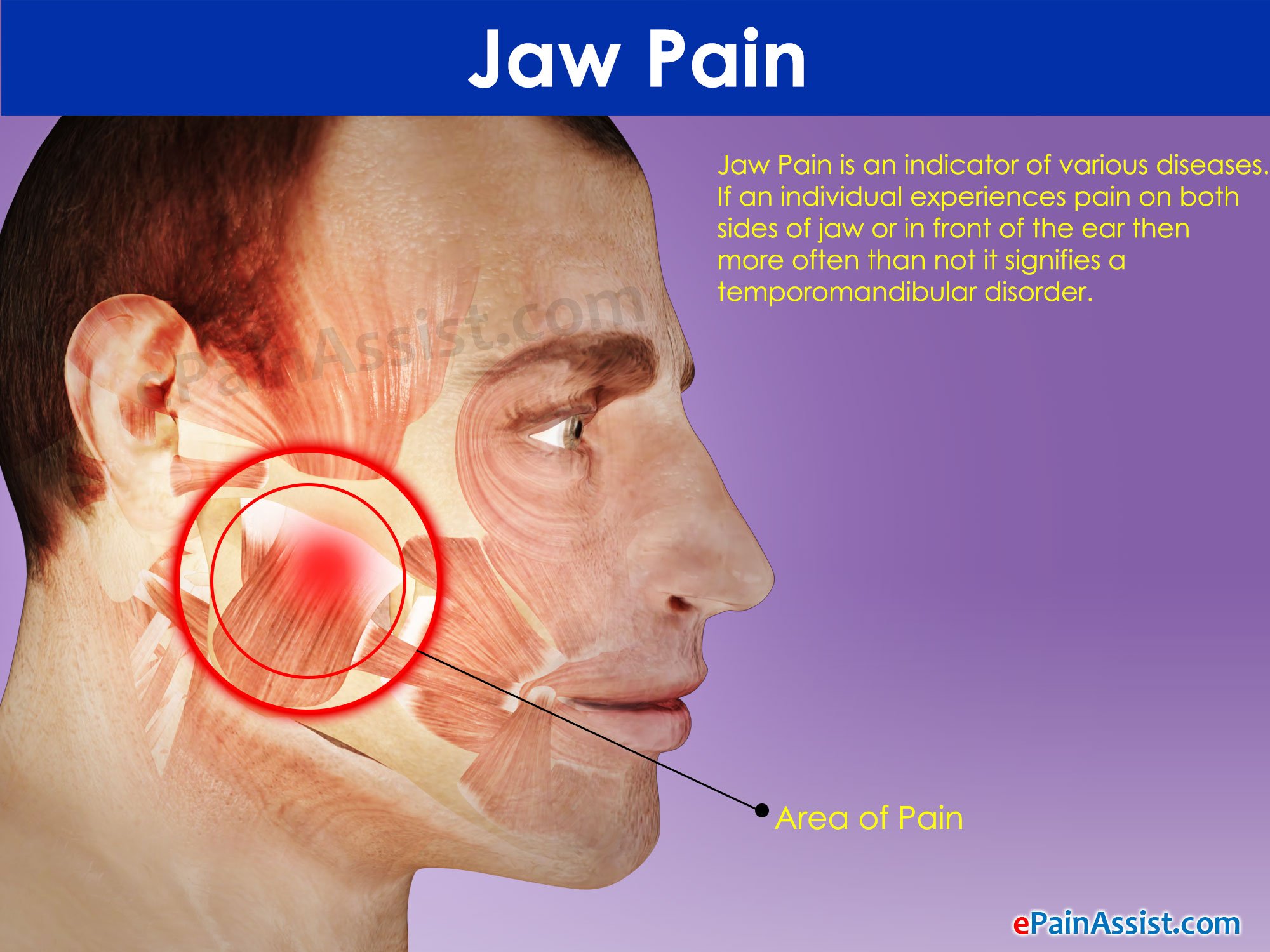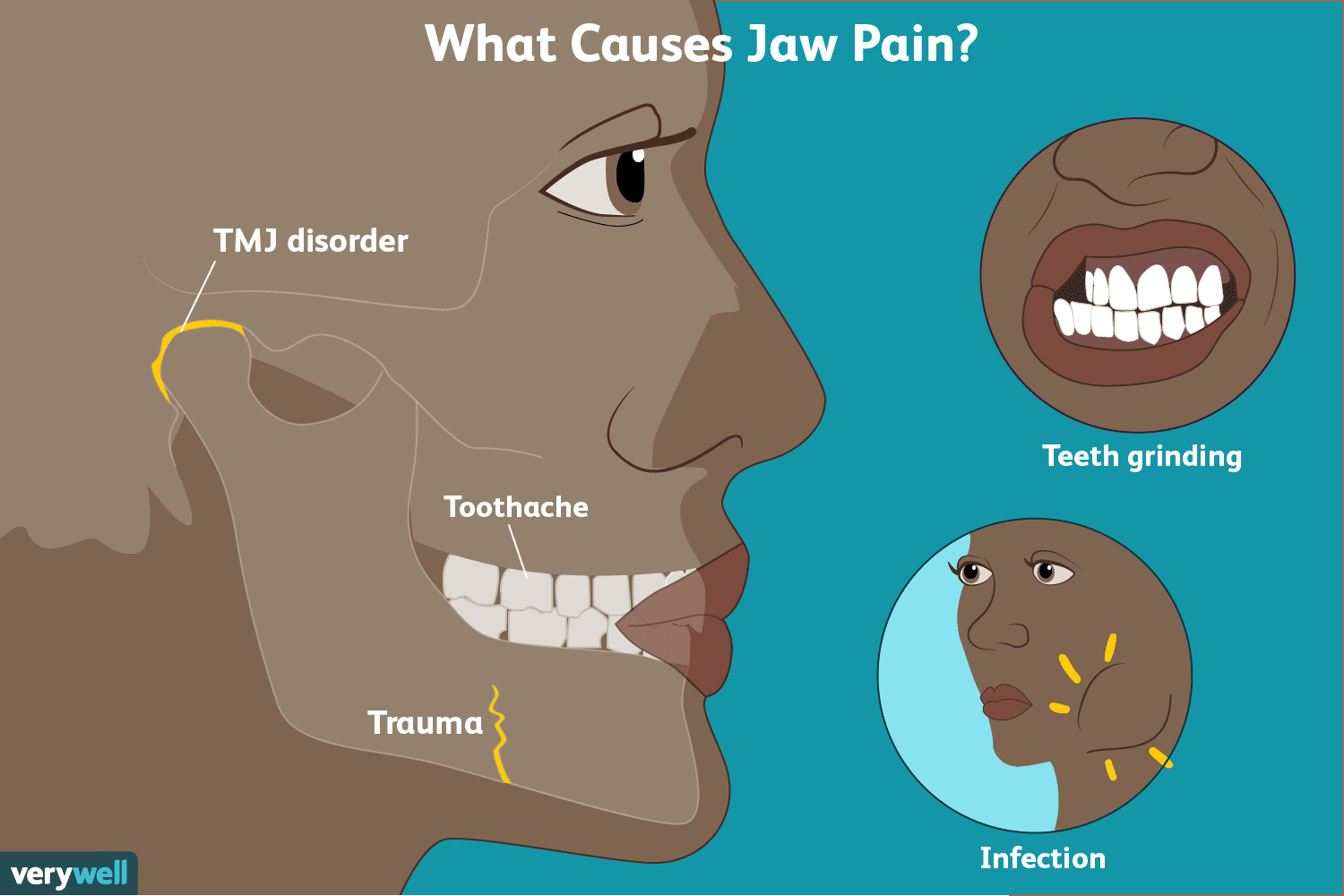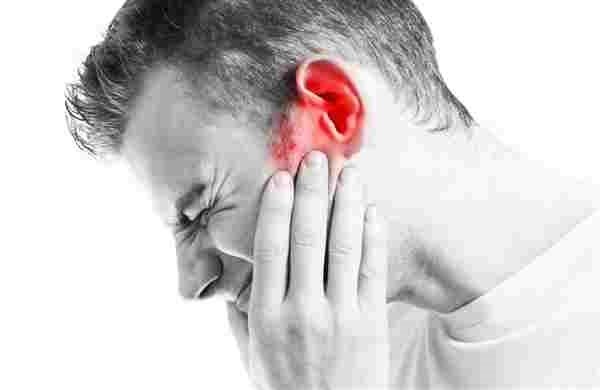How To Treat Ear Pain
The conservative treatment for ear pain caused by temporo-mandibular joint disorder is very simple. First, we recommend a soft diet which means no heavy chewing of foods such as raw fruits and vegetables, hard-crusted bread or tough meat. We recommend soft foods such as noodles, scrambled eggs, well-cooked meat and vegetables to reduce the strain on the jaw joint during eating. Of course, we recommend no chewing of gum or other recreational chewing. We recommend the application of warm packs a couple of times a day to help relax some of the musculature in that area. We also recommend prescription-strength anti-inflammatory medications such as ibuprofen around-the-clock for about a week to reduce the inflammation in that area. These measures should help resolve the TMJ flare. Also helpful is the use of a mouthguard or bite plate, especially during sleep. Mouthguards relieve stress from the joint and our TMJ patients have reported instant relief after use. Mouthguards are available over-the-counter and are quite affordable. There are custom bite plates as well that your dentist can make for you which are much more expensive but also more clinically effective.
Other common causes of ear pain are swimmers ear or excessive wax impaction which are disorders of the ear canal. Also, less common in adults is otitis media which is an infection of the middle ear. This is the same kind of ear infection that babies and young children often get.
Research & Publications
What Is Temporomandibular Joint Syndrome
Temporomandibular joint syndrome is a pain in the jaw joint that can be caused by a variety of medical problems. The TMJ connects the lower jaw to the skull in front of the ear. Certain facial muscles that control chewing are also attached to the lower jaw. Problems in this area can cause head and neck pain, facial pain, ear pain, headaches, a jaw that is locked in position or difficult to open, problems with biting, and jaw clicking or popping sounds when you bite. The temporomandibular joint syndrome is also referred to as the temporomandibular joint disorder. Overall, more women than men have TMJ syndrome.
The TMJ is comprised of muscles, blood vessels, nerves, and bones. You have two TMJs, one on each side of your jaw.
Muscles involved in chewing also open and close the mouth. The jawbone itself, controlled by the TMJ, has two movements: rotation or hinge action, which is opening and closing of the mouth, and gliding action, a movement that allows the mouth to open wider. The coordination of this action also allows you to talk, chew, and yawn.
Also Check: How To Put Phonak Hearing Aids In Pairing Mode
Can Poor Oral Health Affect The Ears
Pain in the ear can indicate a problematic tooth. Dental problems that cause earaches include an abscessed tooth, cavity and an impacted molar or wisdom tooth.
Any issue with the jaw, especially in the temporomandibular joint, such as arthritis, can cause tightness and pain in your ears.
You can also experience earaches and tinnitus because of teeth grinding. Studies on the relationship between oral hygiene and the middle ear show that poor oral health rarely affects the ears.
Read Also: Asl For Hungry
Why That Earache Isnt Going Away
Pain in the ears causes a lot of discomfort and will rob you of the much needed tranquility and quiet everyone wants after a long, hard day. An earache can also rob you of sleep, which is a critical component of good health.
A common way of treating pain in the ears is a dose of antibiotics to get rid of an ear infection. Most infections respond to normal drug therapy, whether it is a chest, tooth or throat infection. Relief from pain indicates that the infection has been dealt with.
But, what do you do when medication fails to alleviate the discomfort? The following post points to what could be the cause of your untreatable earache:
Do You Have an Ear Infection or Is It Really TMJ?
At least once a day, someone comes into our offices complaining of ear pain. Most of our patients think that they have an ear infection based on assumption but it may come as a surprise that most ear pain has nothing wrong with the ears.
The most common cause of ear pain in an adult is the temporo-mandibular joint or TMJ. The temporo-mandibular joint is located extremely close to the ear canal and middle ear. The muscles that surround the temporo-mandibular joint and the fascia and ligaments that hold the bones in place are intricately connected with the ear and the nerve that supports the ear. Read more at Berger Henry
Membership & Affiliation
Can Ear Infection Cause Jaw Pain

Have you ever wondered can ear infection cause jaw pain? Or maybe you were one of the millions of people that had the misfortune of having your own child suffer from ear infections. If you are experiencing ear pain, it can be an indication that your child may be suffering from a fungal infection that can affect the membranes around the ears and mouth.
Although not everyone has this condition, it may be possible that you may have developed an infection when you were young or even as an adult. Some people may develop this type of disease when they are exposed to fungus spores and others may develop it as a result of certain types of food. When children are exposed to fungi, they often get an ear infection as a result. Most of the time, the condition is just asymptomatic, meaning that they will go through life feeling fine while the infection is occurring.
However, some children will be affected when their ears get infected.
You may want to talk to your doctor if you are experiencing pain in your mouth or in other areas of your face that are bothering you.
The cause may be something as simple as poor oral hygiene. If it turns out to be something more serious, you may want to speak to your doctor about finding an effective treatment. You may be surprised to find out that there are many natural remedies you can try to help cure your problem.
Dont Miss: How To Say Sorry In Sign Language
Also Check: How Do You Sign Hungry
Pharmacy First Scotland: Earache Treatment From Your Pharmacy
Earache isn’t usually serious and can be treated by a pharmacist. Your pharmacist may recommend that you contact your GP practice if required.
You should only contact your GP or local out-of-hours service if:
- you or your child also have other symptoms, such as a high temperature , vomiting, a severe sore throat, hearing loss, swelling around the ear, or discharge from the ear
- there is something stuck in your or your child’s ear
- the earache doesn’t improve within a few days
Sinus Infection Can Be Painful
If you are suffering from a sinus infection, it is likely that you will experience ear and jaw pain. A sinus infection can occur when the nasal passages become inflamed and irritated as a result of a cold or allergies or as the result of a virus. If you have sinusitis, it is advisable that you see your doctor. They will recommend a treatment for you, which will resolve the infection and alleviate any uncomfortable symptoms.
Also Check: Hungry Sign Language
The Connections Between Ears Teeth And Jaw
Issues with the temporomandibular joint affect the ears and jaw because it is a connection point between the ears and jaw. It ties the skull to the lower jaw, located next to the ear.
Disorders in this region often result in ear pain and hearing loss. In such cases, pain in the ear indicates a dental problem.
How Is Malignant Otitis Externa Diagnosed
Your doctor will perform a physical exam to determine if you have malignant otitis externa. The exam will include a complete health history. This will allow your doctor to identify underlying conditions that may compromise your immune system.
During the exam, your doctor will look into your ear to see if theres an infection. Your doctor will also examine your head and behind your ear. If theres drainage from the ear, your doctor may take a sample, or culture, of the drainage. Theyll send this sample to a lab for analysis. This will help identify the bacteria causing the infection.
If you have malignant otitis externa, your doctor may perform additional tests to see if the infection has spread. Such tests include:
- a neurological exam
Also Check: Hungry In Sign Language Baby
You May Like: How Do You Say Pretty In Sign Language
What Are The Treatment Options
Treatment for disorders of the TMJ depends on the cause and severity. If you are experiencing mild pain, your doctor may recommend some of these self-care remedies to reduce soreness and tension in the joint:
- Eat soft-foods
- Avoid clenching or tensing your jaw
- Apply moist heat to the area
Anti-inflammatory medication and muscle relaxants can also help to relieve tenderness. A mouthguard may be a treatment option if your TMJ pain is caused by teeth grinding this will prevent damage to the joint. Orthodontic appliances are a great way to correct the upper and lower teeth, as misalignment can result in problems with the temporomandibular joint.
Finding the cause of your ear pain is important because it will lead to getting the correct care. If your earache is a sign of TMJ disorder, the good news is that you can reduce pain and discomfort with a few lifestyle changes. Incorporate breathing exercises to assist with relaxation, which can ease tension on the joint. Speak with your dentist or orthodontist if your TMJ pain is related to an incorrect bite.
Why Does Tmj Cause Ear Pain
The TMJ is located on both sides of the skull, roughly 0.5 centimeters from the ear canal. When these joints and surrounding muscles become inflamed or irritated, the nerve paths that register that pain are connected to the eustachian tube, which equalizes pressure around the eardrum.
The sufferer of TMJ/TMD experiences this discomfort as ear pain. This phenomenon of discomfort felt in a body part other than the affected area is known as referred pain.
Because of the placement of the TMJ and the wide nerve path connected to it, TMD can also manifest as pain in the head, face, neck, and shoulders.
Read Also: How To Pair Widex Hearing Aids To Iphone
What To Do If You Suspect You Have A Tooth Infection
If you suspect you have a tooth infection, you should see a dentist right away for treatment. Dental infections dont usually go away on their own, and they can spread to other parts of the body. Left untreated, they can lead to life-threatening infections in the heart or brain. If you have a fever accompanied by swelling of the face or jaw, the situation could be dire, and you should go to the emergency room if you cant see your dentist right away.
Dont Miss: How Do You Know If You Broke Your Wrist
Mild Pain In Your Jaw Or Ear May Not Be A Cause For Concern

Since root canal treatment requires you to hold your mouth open for a long period of time during the procedure, you may experience some discomfort in your jaw. This pain could radiate to your ear, particularly if an upper molar was treated for an infection.
In addition, the area near your tooth and ear may feel sore due to the injections used to numb the area prior to treatment, causing similar sensations of soreness and pain. This type of pain is nothing to worry about, and it should fade after a few days.
You May Like: Are You Hungry In Sign Language
Ear Infection Affecting Jaw
Ask U.S. doctors your own question and get educational, text answers â it’s anonymous and free!
Ask U.S. doctors your own question and get educational, text answers â it’s anonymous and free!
HealthTap doctors are based in the U.S., board certified, and available by text or video.
Ear Infection Jaw Pain One Side
The reason for an ear infection jaw pain one side is a harrowing experience. Some earaches have caused such excruciating pain that persons were on the brink of insanity.
The cause could be the closeness to the brain, but all earaches must go, whatever the reason. The purpose of these information nuggets is to empower you with the knowledge to help you.
You must understand the information doesnt replace your doctor visits and advice. What it does is help you understand various diseases related to your problem and find a way to resolve it if seeing a doctor isnt possible.
We know that this can happen as life isnt always a straightforward journey, so many will use the internet to answer their problems. If that person is you, there is much to read that informs you to make wise decisions.
You will learn how to treat your body by figuring out the cause of your conditions and treating it. You will learn how to sort the symptoms to know which disease affects you.
These are things that can prove critical to your outcome if you dont have access to medical care or a doctor. Here are the conditions that can cause ear and jaw infections.
Contents
You May Like: Ringing In Your Ear Meaning Spiritual
What Are The First Signs Of A Tooth Infection
Also Check: Sinus Pressure And Congestion Medicine
Rheumatoid Or Psoriatic Arthritis
Rheumatoid arthritis is an autoimmune condition that affects healthy joints. It may lead to joint pain at times that may radiate throughout the rest of the body. Some triggers especially cause rheumatoid arthritis pain. Pain in the jaw, under the ear and in the ear could also be a sign of either rheumatoid arthritis or psoriatic arthritis, another autoimmune condition.
Don’t Miss: Ear Curette Walgreens
The Link Between Oral Health And Hearing Loss
Learning that your hearing health is excellent may make you smile, but did you know that your oral health can actually influence your ability to hear? Tooth decay and gum disease are caused by pathogenic bacteria, which can enter the bloodstream and threaten a persons overall health. In fact, gum disease may lead to heart disease, diabetes, and other chronic health issues . Harmful bacteria that originate in your mouth can also inflame and narrow the arteries and blood vessels located in your ears and brain, which are crucial to your hearing health. Once you understand the link between oral health and hearing loss, we hope you wont ever forget to brush, floss, or visit your dentist.
What Is Causing My Ear And Jaw Pain
Have you been experiencing pain in your ear or jaw? This pain can present as a mild ache, but it can also cause intense pain. Unfortunately, though, there are a number of conditions that can be contributing to your ear and jaw painfrom infections and injuries to joint problems. To help you get a better
Have you been experiencing pain in your ear or jaw? This pain can present as a mild ache, but it can also cause intense pain. Unfortunately, though, there are a number of conditions that can be contributing to your ear and jaw painfrom infections and injuries to joint problems. To help you get a better understanding about ear and jaw pain, lets take a look at some of the most common causes.
Also Check: Signs That Say Merry Christmas
When To See The Dentist
Ideally, you should go to the dentist every six months to a year on average for preventive dental care, including a check-up and dental cleaning according to the American Dental Association . If you have ongoing oral health problems or have a higher risk for periodontal disease or underlying medical problems, like heart disease or diabetes, Dr. Darj may recommend more frequent visits.
But emergencies happen and some dental problems require immediate attention. Pain is usually the main sign that somethings wrong, so you shouldnt wait more than a day or two to schedule an appointment if the pain persists.
- Swollen, red, or tender gums
- Persistent bad breath
- Loose teeth
- Changes to your bite
It can be difficult to tell the difference between a toothache or an earache, so its important not to ignore your symptoms to ensure that you get timely and accurate treatment. If you have an infection, you may need prescription medication to clear it up.
In the case of tooth decay or gum disease, the earlier you get treatment the better. Waiting too long can make your symptoms worse, and increase your risk of permanent damage or even tooth loss.
If youre experiencing pain or other symptoms of an oral health problem, dont wait to get help. Contact us today to schedule an appointment with Dr. Darj at our office in El Paso, Texas.
You Might Also Enjoy
You May Like: How To Say We In Sign Language
Root Canal Infections And Ear Pain

Inside of each tooth is a hollow chamber that contains a substance known as dental. If bacteria accesses the dental pulp , it can cause a painful infection of the tooth. When itâs one of the molars that has been infected, again, the pain can radiate to the ear area.
The best remedy in these situations is root canal therapy, which removes the infected pulp and saves the tooth from being extracted. Patients may also notice ear pain as a sign of an unsuccessful root canal procedure.
Also Check: Are You Hungry In Sign Language
Recommended Reading: Hungry Asl